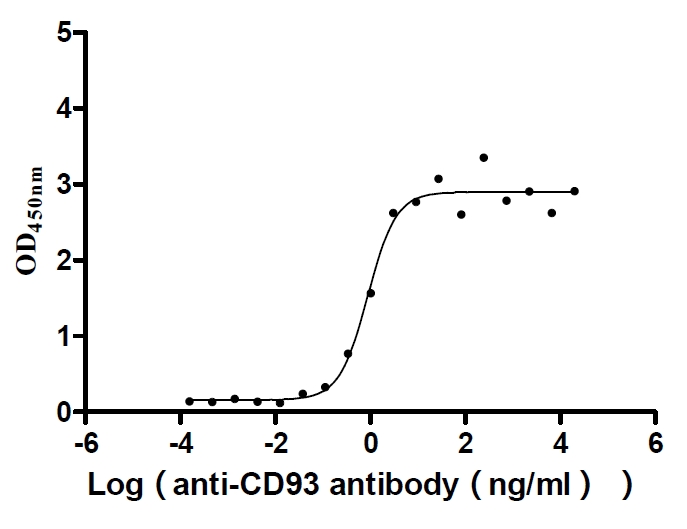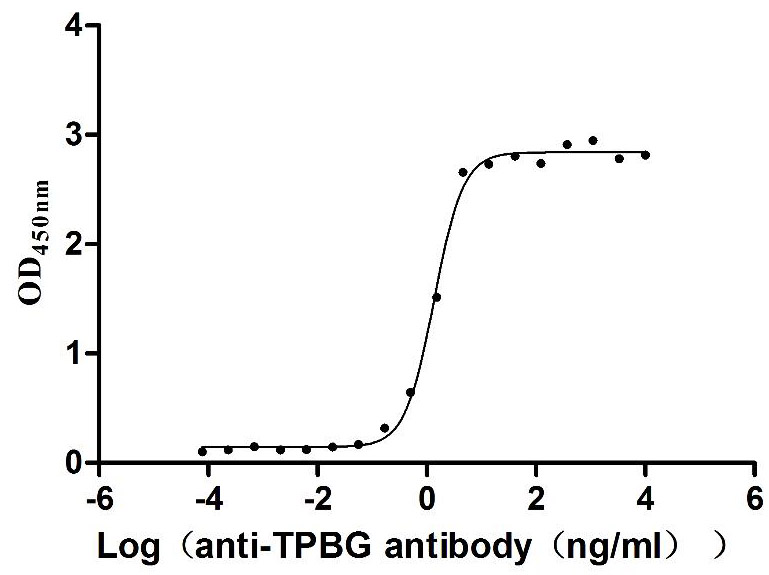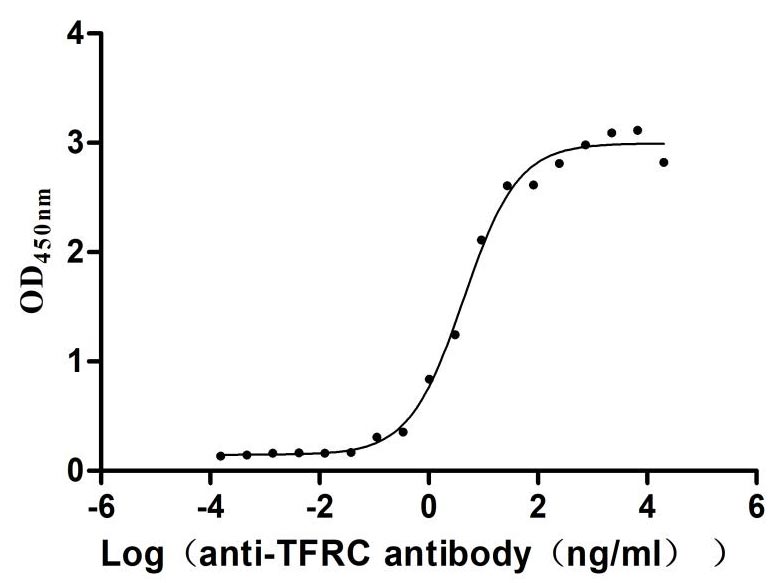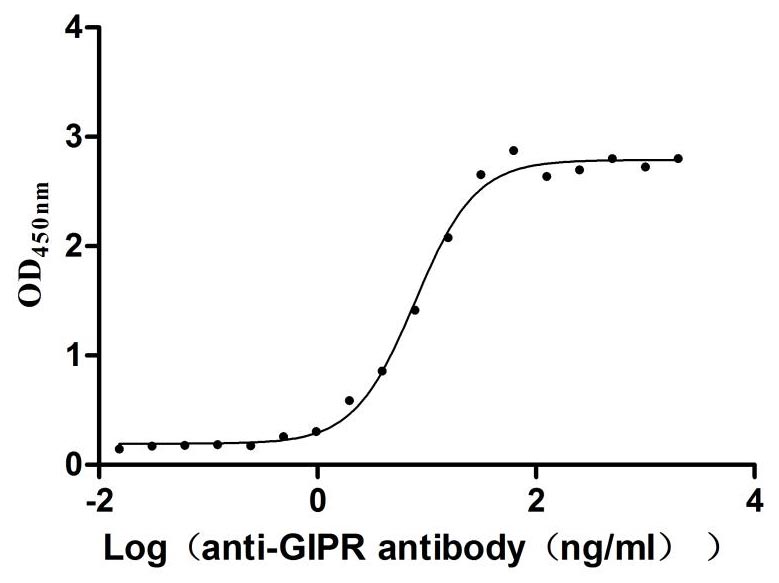Recombinant Human Follistatin-related protein 1 (FSTL1)
-
货号:CSB-YP613266HU
-
规格:
-
来源:Yeast
-
其他:
-
货号:CSB-EP613266HU
-
规格:
-
来源:E.coli
-
其他:
-
货号:CSB-EP613266HU-B
-
规格:
-
来源:E.coli
-
共轭:Avi-tag Biotinylated
E. coli biotin ligase (BirA) is highly specific in covalently attaching biotin to the 15 amino acid AviTag peptide. This recombinant protein was biotinylated in vivo by AviTag-BirA technology, which method is BriA catalyzes amide linkage between the biotin and the specific lysine of the AviTag.
-
其他:
-
货号:CSB-BP613266HU
-
规格:
-
来源:Baculovirus
-
其他:
-
货号:CSB-MP613266HU
-
规格:
-
来源:Mammalian cell
-
其他:
产品详情
-
纯度:>85% (SDS-PAGE)
-
基因名:FSTL1
-
Uniprot No.:
-
别名:Anti FSTL1; FLJ50214; FLJ52277; Follistatin like 1; Follistatin related protein ; Follistatin-like protein 1; Follistatin-related protein 1; FRP; FSL1; FSTL1; FSTL1; FSTL1_HUMAN; Micro RNA 198; MIR198; miRNA198 included; OCC 1; OCC1
-
种属:Homo sapiens (Human)
-
蛋白长度:full length protein
-
表达区域:21-308
-
氨基酸序列EEELRSKSKI CANVFCGAGR ECAVTEKGEP TCLCIEQCKP HKRPVCGSNG KTYLNHCELH RDACLTGSKI QVDYDGHCKE KKSVSPSASP VVCYQSNRDE LRRRIIQWLE AEIIPDGWFS KGSNYSEILD KYFKNFDNGD SRLDSSEFLK FVEQNETAIN ITTYPDQENN KLLRGLCVDA LIELSDENAD WKLSFQEFLK CLNPSFNPPE KKCALEDETY ADGAETEVDC NRCVCACGNW VCTAMTCDGK NQKGAQTQTE EEMTRYVQEL QKHQETAEKT KRVSTKEI
-
蛋白标签:Tag type will be determined during the manufacturing process.
The tag type will be determined during production process. If you have specified tag type, please tell us and we will develop the specified tag preferentially. -
产品提供形式:Lyophilized powder
Note: We will preferentially ship the format that we have in stock, however, if you have any special requirement for the format, please remark your requirement when placing the order, we will prepare according to your demand. -
复溶:We recommend that this vial be briefly centrifuged prior to opening to bring the contents to the bottom. Please reconstitute protein in deionized sterile water to a concentration of 0.1-1.0 mg/mL.We recommend to add 5-50% of glycerol (final concentration) and aliquot for long-term storage at -20℃/-80℃. Our default final concentration of glycerol is 50%. Customers could use it as reference.
-
储存条件:Store at -20°C/-80°C upon receipt, aliquoting is necessary for mutiple use. Avoid repeated freeze-thaw cycles.
-
保质期:The shelf life is related to many factors, storage state, buffer ingredients, storage temperature and the stability of the protein itself.
Generally, the shelf life of liquid form is 6 months at -20°C/-80°C. The shelf life of lyophilized form is 12 months at -20°C/-80°C. -
货期:Delivery time may differ from different purchasing way or location, please kindly consult your local distributors for specific delivery time.Note: All of our proteins are default shipped with normal blue ice packs, if you request to ship with dry ice, please communicate with us in advance and extra fees will be charged.
-
注意事项:Repeated freezing and thawing is not recommended. Store working aliquots at 4°C for up to one week.
-
Datasheet :Please contact us to get it.
相关产品
靶点详情
-
功能:Secreted glycoprotein that is involved in various physiological processes, such as angiogenesis, regulation of the immune response, cell proliferation and differentiation. Plays a role in the development of the central nervous system, skeletal system, lungs, and ureter. Promotes endothelial cell survival, migration and differentiation into network structures in an AKT-dependent manner. Also promotes survival of cardiac myocytes. Initiates various signaling cascades by activating different receptors on the cell surface such as DIP2A, TLR4 or BMP receptors.
-
基因功能参考文献:
- In cultured human pulmonary artery smooth muscle cells, hypoxia-promoted cellular viability, DNA synthesis and migration were suppressed by exogenous FSTL1 but enhanced by small interfering RNA targeting FSTL1 PMID: 28361925
- Study suggests that follistatin like 1 plays an important role in lung fibrosis, and may serve as a novel therapeutic target for treatment of silicosis. PMID: 28341862
- Segmental allergen challenge increases levels of airway follistatin-like 1 in patients with asthma. PMID: 27001159
- Study found that FSTL1 was downregulated in non-small cell lung cancer (NSCLC) cells. FSTL1 overexpression suppressed tumor cell proliferation, altered cell cycle and induced apoptosis in addition to inhibiting cell survival, migration and invasion. Altogether, results revealed the critical tumor-suppression function of FSTL1 in NSCLC progression, suggesting it as an important factor in NSCLC progression. PMID: 29115636
- Smad3 knockdown could restore the inhibition of cell proliferation induced by FSTL1 overexpression in MDAMB231FSTL1 cells, indicating that the antiproliferative effect of FSTL1 overexpression may be associated with Smad3 involved TGFbeta signaling pathway regulation. This study identified FSTL1 as an inhibitor of cell proliferation in MDAMB231 and 231BR cell lines PMID: 29048681
- Dendritic cell-mediated immunity was activated by FSTL1. PMID: 29135371
- Fstl1serves an important role in liver fibrosis and target deletion of Fstl1 attenuated HSCs activation through suppressing TGFbeta1/Smad3 signaling pathway. PMID: 28901425
- Results showed that: 1- FSTL-1 expression is localized to the stromal compartment of the pancreas; 2- FSTL-1 expression is reduced in pancreatic cancer, and 3- FSTL-1 inhibited pancreatic cancer cell proliferation. PMID: 27886258
- Data show that follistatin-like 1 (FSTL1) contributed to unfavorable post-surgical outcome of hepatocellular carcinoma (HCC) patients via inhibiting cell apoptosis. PMID: 28655132
- results indicate that rs1259293 is associated with an increased risk and unfavorable postoperative prognosis of renal cell carcinoma, possibly by down-regulating FSTL1 expression in renal tissues. PMID: 27225192
- Data provide evidence that FSTL1 modestly affects the proliferation of breast cancer cells and vascular endothelial cells. These findings improve the understanding of the functions of FSTL1 in breast cancer development and angiogenesis. PMID: 28857515
- knockdown of FSTL1 inhibited ASM cell proliferation and migration induced by PDGF-BB at least partially via inhibiting the activation of ERK and AKT. These results provide novel insight into the pathogenesis of airway remodeling in childhood asthma and FSTL1 may be a possible therapeutic strategy for the treatment of asthma. PMID: 28393245
- Fstl1 inhibited Smad1/5/8 phosphorylation by blocking the association between bone morphogenetic protein 4 and Bone Morphogenetic Protein Receptors, Type II via competitive binding to bone morphogenetic protein 4. PMID: 29212066
- Data show that follistatin like-1 (FSTL1) was frequently downregulated in nasopharyngeal carcinoma (NPC) cell lines and primary tumor biopsies by promoter hypermethylation. PMID: 26918942
- Results indicate the significance of follistatin-like protein 1 (FSTL1) in driving oncogenesis and metastasis in esophageal squamous cell carcinoma (ESCC) by coordinating NF-kappa B (NFkappaB) and bone morphogenetic proteins (BMP) pathway control. PMID: 28883005
- FSTL1 mRNA levels increased in castration-resistant prostate cancer in association with predominantly nuclear FSTL1. PMID: 27976415
- FSTL1 may induce epithelial mesenchymal transition and airway remodeling by activating autophagy. PMID: 28473327
- DROMs levels positively associated with Fstl1, Hemoglobin A1c and hsCRP levels. PMID: 27145224
- FSTL1 displays anti-inflammatory effects against oxidized low-density lipoprotein-induced pro-inflammatory cytokine production via a mechanism that involves the TLR4/MyD88/NF-kappaB and MAPK signaling pathways. PMID: 27569284
- this study shows that 1) the expression of follistatin-like protein 1 is upregulated in rheumatoid arthritis patients; 2) miR-27a inhibits cell migration of rheumatoid arthritis synoviocytes by targeting follistatin-like protein 1 and restraining the TLR4/NFkappaB pathway PMID: 27498552
- FSTL1 plays a critical role in immune regulation, enhancing the antigen presentation ability of dendritic cells by up-regulating NF-kappab expression and down-regulating JNK expression. PMID: 27859422
- the knockdown of FSTL1 induces apoptosis through a mitotic arrest and caspase-dependent cell death. FSTL1 plays the important roles in cellular proliferation and apoptosis in lung cancer cells, and thus can be a new target for lung cancer treatment. PMID: 26716515
- Children with chronic heart failure group had a significantly higher serum level of FSTL1 than the control group. PMID: 26903060
- provide mechanistic insight into the regulation of erythropoiesis by FSTL1 signaling and lay a foundation for exploring FSTL1 signaling as a therapeutic target for anemia PMID: 26365350
- FSTL1 is elevated in patients with osteoarthritis and involved in the progression of synovial inflammation. PMID: 25888873
- administration of Fstl1 induced airway remodeling and increased OSM, whereas administration of an anti-OSM Ab blocked the effect of Fstl1 on inducing airway remodeling, eosinophilic airway inflammation PMID: 26355153
- data suggest that the loss of epicardial FSTL1 is a maladaptive response to injury, and that its restoration would be an effective way to reverse myocardial death and remodelling following myocardial infarction in humans PMID: 26375005
- Fstl1 is induced in response to lung injury and promotes the accumulation of myofibroblasts and subsequent fibrosis. These data suggest that Fstl1 may serve as a novel therapeutic target for treatment of progressive lung fibrosis. PMID: 25584011
- FSTL1 is elevated in various inflammatory conditions and decreased during the course of treatment. FSTL1 may therefore be a valuable biomarker for such diseases. PMID: 24838142
- FSTL1 is a potential mediator of inflammation and insulin resistance in obesity. PMID: 24347831
- These results suggest that FSTL-1 may act on the NLRP3 inflammasome to promote IL-1beta secretion from monocytes/macrophages. PMID: 24470197
- results demonstrated that follistatin-like protein 1 (Fstl1) is expressed and secreted by human myotubes and plasma Fstl1 levels are increased after exercise PMID: 23419164
- A clear inverse correlation between the expression pattern of FSTL1 (pro-migratory) and miR-198 (anti-migratory) highlights the importance of this regulatory switch in controlling context-specific gene expression to orchestrate wound re-epithelialization. PMID: 23395958
- Data show that the serum and synovial fluid (SF) FSTL1 levels were markedly higher in female OA patients than in males. PMID: 22117761
- FRP has the function of evoking innate immune responses as one of the endogenous TLR4 agonists. PMID: 22265692
- Elevated FSTL1 levels reflect not only joint diseases but also inflammation and tissue degradation in systemic autoimmune diseases. PMID: 21303509
- These data suggest that Cx43 inhibits the invasion and metastasis of pulmonary giant cell carcinoma cells by modulating the secretion of FSTL1, which is regulated by histone acetylation. PMID: 21718795
- DIP2A could be a cell-surface receptor protein and mediate a FOS down-regulation signal of FRP. FRP bound to DIP2A and CD14, and also with proteins of the TGF-beta superfamily PMID: 20860622
- Whilst follistatin expression is unchanged, follistatin-related gene is down-regulated in endometrial carcinoma. PMID: 15296481
- FRP mRNA is overexpressed in rheumatoid arthritis synovium, the product of which exerts inhibitory activity on synovial cell growth PMID: 15638044
- TSC-36 can be induced in VSMCs (vascular smooth muscle cells) and inhibits VSMCs proliferation in vitro and in vivo. PMID: 16256108
- Elevated myocardial expression of FST-like genes is a feature of heart failure and may be linked to both disease severity and mechanisms underlying recovery. PMID: 18617621
- Fstl1 is a secreted muscle protein or myokine that can function to promote endothelial cell function and stimulates revascularization in response to ischemic insult through its ability to activate Akt-eNOS signaling PMID: 18718903
- Cell migration and invasion assays demonstrated a remarkably lower cell migration and invasion capability in FSTL1-transfected cells in relation to downregulation of matrix metallopeptidase-2 PMID: 18796737
- FSTL-1 is overexpressed by 2-3-fold in synovial tissues of rheumatoid arthritis patients compared with control synovium obtained from subjects undergoing knee arthroscopic anterior cruciate ligament repair. PMID: 19109154
显示更多
收起更多
-
亚细胞定位:Secreted.
-
组织特异性:Overexpressed in synovial tissues from rheumatoid arthritis.
-
数据库链接:
HGNC: 3972
OMIM: 605547
KEGG: hsa:11167
STRING: 9606.ENSP00000295633
UniGene: Hs.269512
Most popular with customers
-
Recombinant Human Tumor necrosis factor receptor superfamily member 18 (TNFRSF18), partial (Active)
Express system: Mammalian cell
Species: Homo sapiens (Human)
-
Recombinant Human Leukemia inhibitory factor receptor (LIFR), partial (Active)
Express system: Mammalian cell
Species: Homo sapiens (Human)
-
Recombinant Human Claudin-18.2 (CLDN18.2)-VLPs (Active)
Express system: Mammalian cell
Species: Homo sapiens (Human)
-
Recombinant Human Intestinal-type alkaline phosphatase (ALPI) (Active)
Express system: Mammalian cell
Species: Homo sapiens (Human)
-
Recombinant Human Complement component C1q receptor (CD93), partial (Active)
Express system: Mammalian cell
Species: Homo sapiens (Human)
-
Recombinant Human Trophoblast glycoprotein (TPBG), partial (Active)
Express system: Mammalian cell
Species: Homo sapiens (Human)
-
Recombinant Human Transferrin receptor protein 1 (TFRC), partial (Active)
Express system: Mammalian cell
Species: Homo sapiens (Human)
-
Recombinant Rat Gastric inhibitory polypeptide receptor (Gipr), partial (Active)
Express system: Mammalian cell
Species: Rattus norvegicus (Rat)


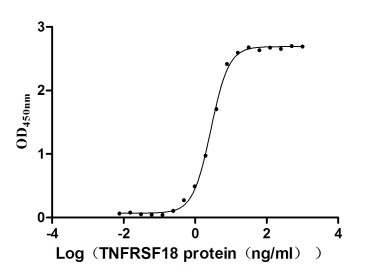
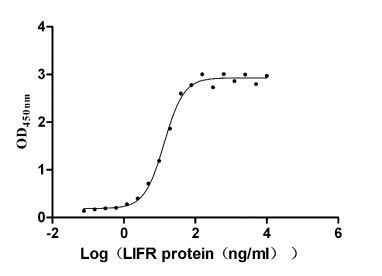
-AC1.jpg)

